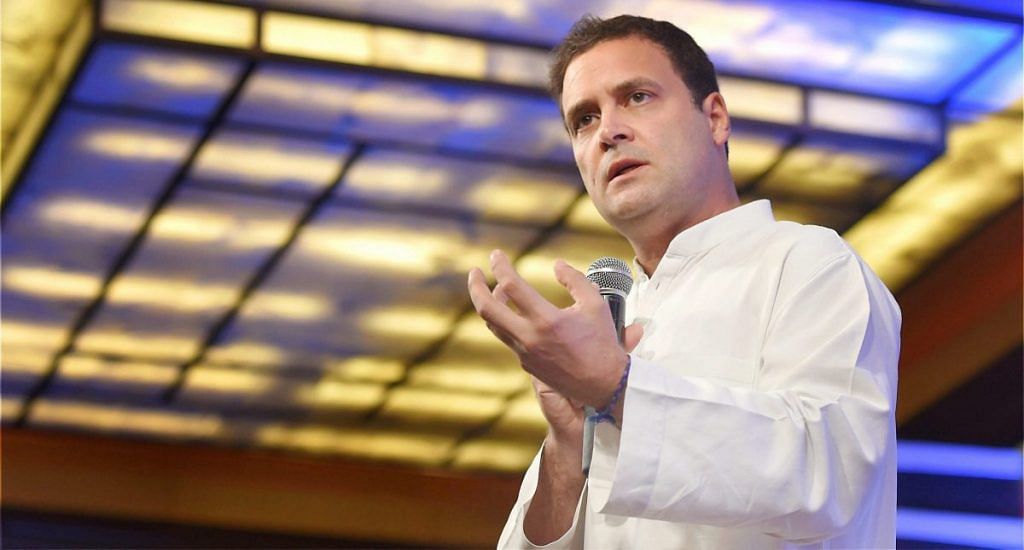The well-wishers of the opposition, or rather the ‘ill-wishers’ of Prime Minister Narendra Modi, are either lamenting the delay in forging a strong mahagathbandhan or are advising the opposition.
Their advice is this: The opposition parties should give up their egos, forget the bitter past, overcome their prejudices towards each other, create a common minimum programme, sacrifice claims on the number of seats.
These well-wishers are, however, divided on their perception of Rahul Gandhi. Some of them say that he has come a long way, matured as a politician and is boldly confronting PM Modi. Also that Rahul Gandhi has shown an accommodative spirit in aligning with the JD(S) in Karnataka despite the Congress being a much larger party.
From Pratap Bhanu Mehta to Pritish Nandy, there is a growing appreciation of Rahul Gandhi’s emerging leadership among political analysts. Some others, however, still consider Rahul Gandhi to be a liability to the Congress and the opposition. The metropolitan elite is still, by and large, hostile to him, although not to Priyanka Gandhi Vadra yet. Indeed, the elite is more critical of Rahul Gandhi than even Modi. But both, pro and anti-Rahul advisers say that he is a major factor for any opposition front.
Also read: Rahul Gandhi is in danger of frittering away the advantage Modi govt gifted him
We are still not clear about what is going to emerge from the negotiations among the opposition parties. Various formulae have emerged — Federal Front, Third Front, Non-BJP-non-Congress Front, state-wise alliances, etc. Some argue that it is not necessary to announce the prime ministerial candidate in advance, and they can arrive at a consensus after the results.
But the fundamental question is: Why is there such disunity, if indeed all of them fear the return of Modi with more than 200/225 seats or with a simple or large majority? What prevents them from coming together? Their egos, competitive ambitions, political immaturity, prejudices, hatred towards each other, protection of their fiefdoms, or simply their behavioural stubbornness?
There are also some soft BJP supporters who keep a close watch on the opposition’s dialogues and divisions. Some columnists or apologists have gleefully argued that even if they come together, they will disintegrate after coming to power, if at all, and force a mid-term national election. And how that will bring back Modi as the only leader who can provide stability. They remind us of how Indira Gandhi came back in 1980 with a grand majority after the Janata Party coalition collapsed.
On the other hand, there are some RSS and even BJP supporters who want Modi to be “cut to size”, and yet do not want the opposition alliance to win. A weakened Modi could be kept in check or he could even be replaced, is their wish.
Although there is discontent against Modi’s autocratic style within the BJP, the disgruntled members do not have the guts to rebel. Neither frustrated L.K. Advani and Murli Manohar Joshi, nor rebels like Yashwant Sinha or Arun Shourie could mobilise enough support from the party ranks.
Also read: Not opposition unity, but BJP’s critical mini-gathbandhans stole the thunder
As a consequence, it is not the BJP versus united or disunited opposition, but Modi versus the rest. (The rest includes some BJP leaders and some NDA partners). However, it is not adequately recognised that almost all the so-called opposition parties have often followed “anti-Congressism” as if it is an independent ideology.
The maverick Arvind Kejriwal’s Aam Aadmi Party or Peoples Democratic Party in Kashmir, the DMK as well as the AIADMK, Samajwadi Party (SP) as well as all the socialists, the Bahujan Samaj Party (BSP) or all the Republican Party factions, Telugu Desam as well as Telangana Rashtra Samithi, Janata Dal(S) and also Janata Dal(U), both the Communist parties, CPI and the CPM, the Biju Janata Dal and Rashtriya Lok Dal (RLD), the Trinamool Congress and the Forward Block, the Nationalist Congress Party of Sharad Pawar and the National Conference in Jammu and Kashmir — all have a legacy of strident anti-Congressism. They too want a weak Congress or a ‘Congress-mukt Bharat’. They resist the opposition formation that can help revive Congress.
To compare the anti-Congress alliances with anti-BJP alliances is not politically logical. All these parties have at one time or the other been in power with the BJP or in alliance with the BJP. While some of them were also in alliance with the Congress, their DNA has remained strongly anti-Congress.
But that brings us back to the original question: What really divides them? None of them oppose liberal economic policies and foreign capital (except the Communists, but mildly now), all of them profess socialism (even the BJP, which called itself Gandhian Socialists), all of them advocate secularism (even the BJP, which says they are genuinely secular and the Congress is pseudo-secular). Ideology is not the criterion now.
Also read: A national security election gives Rahul Gandhi the perfect excuse to lose
Political sociologists call disintegration or integration a structural phenomenon. Take the analogy globally. Why did Europe come together? And why are the 28 countries in Europe not able to stay together? Brexit led to speculation that the European Project is over. Political sociologists also argue that identity, ideology, economy, culture, history are some of the factors that lead to conflicts—within nations as well as within alliances. They apply this logic to even corporate houses. The survival instinct does not necessarily hold them together. Many large houses have disintegrated and perished.
Neither survival instinct nor ego defines the collective behaviour of people. There are umpteen examples which show that just as power unites, it also brings about disunity. Therefore, just because the opposition is facing an existential crisis, it does not mean that it will not self-destruct.
The author is a former editor and Congress member of Rajya Sabha.
